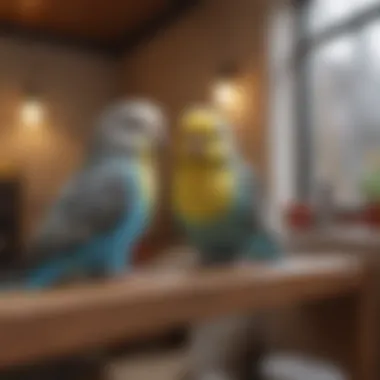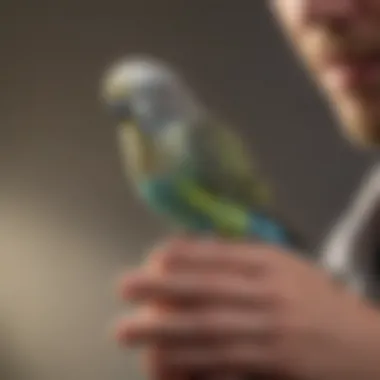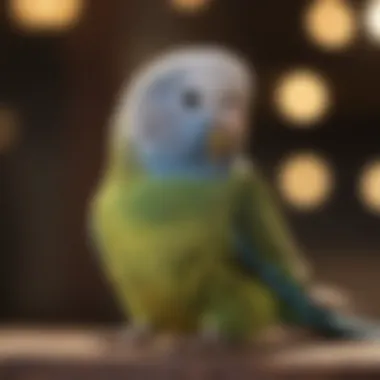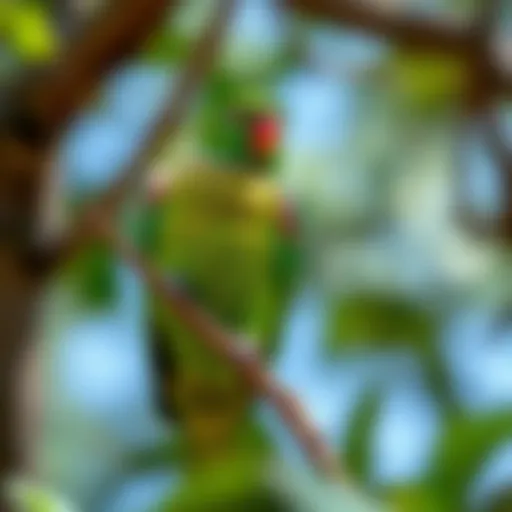The Ultimate Guide to Rehoming Budgies Responsibly


Intro
Rehoming a budgie can be as complex as birdwatching through the lens of a telescope. It’s not merely about finding a new home; it involves understanding the needs and emotional states of these vibrant creatures. In a world where the sensations of love and companionship across species are often taken for granted, added responsibility comes into play when considering a new family for your feathered friend.
This journey is informed not just by the desire to ensure your budgie is well cared for, but also by the emotional weight such a transition imposes on both the bird and the owner. A carefully planned approach can significantly improve the chances of a smooth transition. This guide lays out the foundational aspects to consider while rehoming your beloved budgie, equipping you with the nuances that might otherwise be overlooked.
Beyond the simple act of finding a new owner, this guide will delve into the essential considerations surrounding avian care. It will cover aspects like proper nutrition, habitat setup, and health and safety, as these elements are pivotal in ensuring that your budgie lands softly in its new home. Additionally, understanding the importance of emotional well-being, trust, and connection with potential new owners can make a world of difference.
Let’s get started on this enlightening journey towards responsible rehoming, beginning with the intricacies of avian care.
Understanding the Need for Rehoming
Rehoming a budgie is a significant decision that should not be taken lightly. Understanding the reasons behind this choice is crucial for both the current owner and the prospective new owner. Often, rehoming stems from personal circumstances that can impact the bird’s quality of life. A deeper exploration into this topic can illuminate the motivations that lead to such a decision, ultimately paving the way for a more compassionate approach.
Common Reasons for Rehoming
Many factors can contribute to the decision to rehome a budgie. Here are some frequent reasons:
- Lifestyle Changes: Sometimes life throws curveballs—like a new job, moving to a different city, or personal health issues. These changes can diminish the time and attention available for your pet.
- Behavioral Challenges: Budgies, with their spirited nature, can sometimes present behavioral issues. An owner might feel overwhelmed by a bird that nips, screams, or refuses to engage.
- Family Dynamics: Family additions, whether human or pet, can shift priorities. For instance, a newborn might lead parents to rethink their space and focus.
- Financial Constraints: The cost of maintaining a pet can add up. Vet visits, food, and supplies can strain a budget, prompting owners to consider rehoming.
- Lack of Knowledge: Some might dive into bird ownership without fully grasping the needs of a budgie. When the reality sets in, rehoming might seem like the best option.
It is vital to recognize that these reasons, while common, do not define one as a bad owner. Often, circumstances are beyond anyone’s control. Evaluating the core reason for rehoming can help ensure a successful transition for the budgie.
Evaluating Your Situation
Before you embark on the rehoming journey, it's important to take a step back and reflect on your situation. Consider the following:
- Is the Reason Temporary?: If it’s a temporary hurdle—like a short-term illness or travel—it might be worth exploring alternatives like asking a trusted friend to care for your budgie until things settle down.
- Can You Adapt?: Sometimes modifications, like setting up a more stimulating environment or adjusting your schedule to include bird time, might resolve the issues you’ve been facing.
- Future Commitments: Think about your upcoming commitments. If it looks like you might have more time in the near future, it may be worthwhile to reconsider rehoming.
It’s essential to be honest during this evaluation phase. If rehoming is the most suitable option, approaching it mindfully will lead to better outcomes for both you and your budgie.
Emotional Implications
Rehoming a budgie carries with it a plethora of emotional ramifications. One may not anticipate the feelings that accompany this choice. Here are some emotions one might experience:
- Guilt: It’s common to feel guilty about rehoming a pet. You might wonder if you’re failing them, but bear in mind that sometimes you’re acting in their best interest.
- Sadness: Parting with a beloved budgie can tug at the heartstrings. Reflect on all the joyful moments spent with your bird. Acknowledge that it’s okay to mourn the loss of companionship.
- Relief: In some cases, a sense of relief can accompany the decision, especially if it alleviates stressors in your life. Recognizing this feeling can help you navigate the process moving forward.
- Hope: Trust that by finding a new loving home, you’re offering your budgie a chance for a fresh start. Embrace the idea that both parties can potentially embark on new journeys.
"Remember that rehoming doesn’t negate the love you have for your budgie; it simply means seeking a better fit for both of you."
Preparing for Rehoming
Rehoming a budgie is not a task you take lightly; it’s a decision that comes with its own sets of pros and cons, not to mention a hefty emotional weight. Preparing for rehoming is crucial as it sets the tone for a seamless transition for both the bird and the new owner. By taking the time to plan ahead, you can ensure that your budgie will not only adjust smoothly to their new settings but will also find a home that meets their needs. The planning phase is as much about understanding your budgie as it is about finding the right match.
Assessing Your Budgie's Needs
Understanding your budgie's individual needs is the first move on this chessboard. No two budgies are created equal; their requirements can vary widely based on personality and history. Ask yourself:
- What are their preferences? Does your budgie prefer to nibble on specific toys or engage in certain activities?
- What are their social habits? Are they more of a social butterfly or a loner?
- Medical history? Does your budgie have any health conditions that require special care?
Such inquiries allow you to gauge their unique temperament, which in turn will help you advocate effectively for their needs when discussing with potential adopters.
When facilitating the rehoming, consider making a documentation folder that includes records of vet visits, dietary habits, and behavioral quirks. This step will not just smooth over any concerns potential adopters might have, but it could also save your budgie unnecessary stress down the line.
Creating a Rehoming Plan
Once you've gauged your budgie's individual needs, it's time to lay it all out in a rehoming plan. This is the backbone of a successful rehoming process. A planned approach helps maintain clarity and reduces the overwhelm that comes with change. Here’s how you can start:
- Determine the Timeline: Establish when you want to complete the rehoming process. Is it a few weeks or a few months? Knowing your deadline will help you prioritize tasks.
- Research Potential Adopters: Are there specific qualities you're looking for in a new owner? Make a checklist that outlines what makes an ideal candidate.
- Prepare Information for Adopters: Take the time to create a profile detailing your budgie’s needs, habits, and quirks.
A well-structured plan doesn’t just foster a thoughtful process—it lays down groundwork for a smooth transition that honors your budgie’s unique lifestyle.
Gathering Necessary Supplies


As you move forward, don’t forget the practical aspect involved in rehoming: gathering supplies. This doesn’t just include physical items; it also means preparing your budgie for their new life.
You may want to consider gathering the following:
- Cage: If your budgie is currently in a cage suited for its size, be sure to include this with the budgie.
- Toys & Accessories: Once again, keep in mind their preferences. Adding toys they’re familiar with can help ease the transition.
- Food: Providing some of their current food helps maintain dietary consistency in the transition phase.
- Info Sheets: Create guides on care routines, feeding schedules, and any other information about their handling.
It’s not merely about packing everything neatly away, but ensuring that what you send along will provide stability and comfort to your budgie during this period of change.
"Preparation is the key to success; without it, the future can feel uncertain and unsteady."
Taking the time to prepare properly means you’re not just doing right by your budgie; you’re also setting up their new caregiver for success. This level of consideration shouldn’t be underestimated.
Finding a Suitable New Home
Finding a suitable new home for your budgie is a pivotal step in the rehoming process. The right environment can enhance your bird's quality of life significantly. Not only does this ensure that your feathery friend receives appropriate care, but it also brings peace of mind to you, the previous owner. The act of rehoming, though sometimes difficult, can also be a positive transition if done with the right preparation and forethought.
Identifying Potential Adopters
When it comes to finding potential adopters, you want to cast a wide net while still being particular about the people who may take in your budgie. Start by reaching out to your circle—friends, family, or acquaintances who have expressed an interest in bird care. Social media platforms can also be an effective avenue. Join Facebook groups or forums dedicated to pet birds where prospective adopters often seek new companions. Additionally, local avian veterinarians or pet shops may know of responsible individuals looking to adopt.
"A bird in the hand is worth two in the bush, but finding the right hand is crucial for your budgie's future."
To ensure you attract serious applicants, you may want to draft a brief description of your budgie’s personality, habits, and needs. This can help filter out those who may not be suited for the bird. Providing photos can also go a long way in sparking interest.
Conducting Interviews with Adopters
Once you've gathered a list of potential adopters, it’s time to dig deeper. Conducting interviews is a critical phase where you gauge the enthusiasm and commitment of each candidate. Ask questions about their experience with pet birds—this gives insight into how well they understand the responsibilities involved.
Some questions you might consider include:
- What attracted you to adopting a budgie?
- Have you owned birds before? If so, what happened to them?
- How do you plan to integrate the budgie into your home?
- Are you aware of the dietary and social needs of budgies?
These questions not only help you evaluate their suitability but also serve as an educational moment where you can share insights and offer advice. It’s not just about finding a home; it's about ensuring the bird ends up in a caring environment.
Assessing the Adopter's Environment
Once interviews are complete, you should assess the potential adopter's environment to ensure it aligns with your budgie's needs. Ask to see where the bird will live; look for things like appropriate space, safety, and enrichment. A well-situated cage away from drafts and direct sunlight should be a minimum requirement.
Consider these factors:
- Is the cage spacious enough, allowing for flight and activity?
- Are there other pets in the household that may pose a threat?
- Is the location quiet enough to avoid stressing the budgie?
- Will the new owner provide enough interaction and mental stimulation?
Remember, you’re not just searching for any home, but the right fit. If you feel that a prospective adopter's environment lacks crucial aspects, even if they seem enthusiastic, it’s okay to look elsewhere. Your primary concern is for the well-being of your budgie, and taking the time to ensure a good match is well worth the effort.
The Transition Period
The transition period is a critical phase that requires keen attention from both the original owner and the new adopter. This duration, which begins during transportation and continues as the budgie settles into a new environment, can significantly influence the well-being and happiness of the bird. Properly managing this interval can mitigate stress, ensuring that the transfer from one home to another is as smooth as possible for all involved.
Transporting Your Budgie Safely
When preparing to transport your budgie, safety should be the foremost concern. Harnessing a secure and comfortable method will set the stage for a successful transition. Here are key pointers to follow when transporting your feathered friend:
- Use a well-ventilated carrier: A small bird carrier designed specifically for pets is ideal. Opt for one that's spacious enough but not overly large. Excess space can cause the budgie to feel insecure during the ride.
- Avoid sudden exposure to extreme temperatures: Ensure that the temperature inside the vehicle is stable. If it’s too hot or too cold, your budgie may become distressed.
- Limit noise levels: Sounds from traffic or loud music can agitate your budgie. Keeping the carrier covered with a light cloth can help keep it calm, mimicking its natural feeling of safety.
In the end, a smooth transportation process lays the groundwork for a less stressful adaptation to the new home.
Introducing the Budgie to Its New Home
Once you’ve arrived at the new residence, the next step consists of integrating your budgie into its new surroundings. This is no trivial task, as the bird may feel overwhelmed by new sights and sounds. Here's how to ease the adjustment:
- Create a designated space: Before introduction, ensure the bird's cage is set up in a quiet area away from heavy foot traffic. It should be full of familiar toys and perches to ease any anxiety.
- Allow exploration time: Initially, keep the door of the cage closed and allow the budgie to observe its new home at its own pace. Rushing the process may lead to unnecessary stress.
- Familiarize with voices: Speaking softly around the area can comfort the budgie. It might recognize familiar voices or tones from its previous home, which can help in calming it down.
"Patience is key when it comes to introducing your budgie to a new environment. Rushing may cause setbacks in the bonding process."


Monitoring Adjustment and Behavior
The adjustment phase might span several days or even weeks. During this time, the following considerations are crucial:
- Observe behavior: Watch for any signs of distress or unusual behavior, such as excessive vocalization, plucking feathers, or refusing food. These can indicate that the budgie is having trouble acclimating.
- Encourage exploration: Gradually allow your budgie to take supervised trips outside the cage. Ensure that it's a safe environment, free of potential dangers.
- Consistency is vital: Stick to a daily routine regarding feeding, special treats, and social interactions. This structure helps the budgie feel secure as it begins to understand its new living situation.
Through careful orchestration of every step in this transition period, both the original owner and the new caregiver can help the budgie settle into its new life with ease and comfort.
Post-Rehoming Considerations
Rehoming a budgie is not just a matter of finding a new owner; it involves thoughtful reflection on what happens after the transfer. Post-rehoming considerations are essential to ensure both the bird and new owner adjust well, ultimately leading to a healthy and happy partnership. This phase can be equally as emotional as the decision to rehome itself. Therefore, it's crucial to think ahead and make provisions for the well-being of everyone involved.
Maintaining Communication with New Owners
Keeping the lines of communication open with the new owners is vital. This relationship can help ease concerns for both you and the new family. Here are some strategies:
- Regular Check-Ins: Schedule a time to check on how things are going after the budgie has settled in. A simple message can alleviate a lot of worries.
- Provide an Open Door Policy: Let the new owners know that they can reach out with any questions or concerns. This gesture shows that you genuinely care about your budgie's well-being.
- Share Resources: Whether it’s a favorite toy or specific diets, sharing tips can make the new owners feel more confident in their role.
Open communication fosters a sense of community, helps the new owners find their footing, and allows you to maintain a connection with your feathered friend.
Resources for the New Owner
Equipping new owners with the right resources is one of the best gifts you can give. A well-informed owner is more likely to foster a happy and healthy life for your budgie. Consider providing the following:
- Books and Guides: Recommend books such as "Budgies: A Complete Guide to Caring for Your Pet Budgerigar". Knowledge on diet and behavior can be particularly helpful.
- Online Communities: Direct them to forums like reddit.com or specific Facebook groups where they can connect with other budgie owners.
- Veterinary Contacts: Sharing the contact information of avian veterinarians can be lifesaving in emergency situations.
These resources can empower new owners and help turn initial uncertainties into confidence.
Dealing with Your Own Emotions
It's natural to experience a rollercoaster of emotions after rehoming a pet. This is often overlooked, but managing your feelings is just as important in the post-rehoming phase:
- Acknowledge Your Feelings: Whether it's relief, guilt, or sadness, give yourself permission to feel these emotions. Acknowledging them is the first step in moving forward.
- Seek Support: Consider reaching out to friends or family members who've been through similar experiences. Sharing stories can help validate your feelings.
- Reflect on Your Decision: Take time to consider why you made the choice to rehome. These reflections can be beneficial and can aid your emotional healing process.
Bouncing back from the act of rehoming requires patience and understanding, both towards yourself and the situation.
Remember, responsible rehoming is not a failure; it’s a compassionate decision for both the bird and its previous owner.
Ethical Considerations in Rehoming
When time comes to rehome your budgie, ethical considerations weigh heavily on both the original owner and the future caretakers. It’s not just a matter of finding someone who can provide food and shelter; it extends to ensuring the new environment is one that fosters the bird's well-being. Rethinking the transition is crucial—responsible rehoming reflects a commitment to the budgie’s happiness and quality of life.
Understanding Animal Rights
The concept of animal rights pertains to recognizing that all creatures, including our feathered friends, deserve humane treatment. Budgies are not merely pets; they are sentient beings capable of feeling joy, discomfort, and stress. Rehoming your budgie thoughtfully involves more than logistics. It’s about considering their emotional and physical needs.
- Welfare and Autonomy: Budgies thrive in environments that respect their instinctual behaviors like flying, climbing, and playing. The new owner should understand these needs. If a potential adopter suggests keeping the budgie in isolation for long periods, that may raise red flags—birds, like people, need social interaction and space.
- Compassionate Rehoming: When making the decision to rehome, one should ask: "Can I find a situation that prioritizes my budgie’s well-being?" Understanding the depth of this question is vital to ethical rehoming. Your budgie’s next home should ideally be a sanctuary, not just a stopover.
Legal Obligations for Rehoming
Legal considerations can play a significant role in rehoming. Depending on where you live, there might be specific laws or regulations surrounding pet ownership and transfers.
- Ownership Transfer: Check local laws regarding the transfer of pet ownership. For example, some areas may require documentation to prove that the new owner is fit to care for the budgie. Failing to adhere to such laws can lead to issues down the line.
- Health Regulations: Ensure that your budgie is in good health before rehoming, as certain regions might require health certificates or proof of vaccinations. This is not just a legal point; it underscores the value you place on your pet's health and future.
- Avoiding Abandonment: Ethically, it’s important to never abandon a pet or drop it off at a shelter without proper arrangements. Always have a plan that considers the bird's welfare. Leaving them in a precarious situation is not just illegal in many places, but it’s also morally questionable.
"Taking the time to ensure that rehoming is ethical safeguards not only the future of your budgie but fosters a broader sense of responsibility in the pet community."
Incorporating these ethical considerations into the rehoming process can make a world of difference. Every bird deserves a home that celebrates its spirit and allows it to thrive.
Resources and Support for Budgie Care
When it comes to ensuring the well-being of your budgie, having the right resources and support is crucial. This can make all the difference in your journey as a bird owner or when considering the rehoming process. Understanding the available avenues for information and assistance is key to fostering a nurturing environment for your feathered friend.
Recommended Books and Websites


Books and websites are a treasure trove of knowledge for budgie care. Here are some standout resources:
- "The Budgie Book: Understanding Your Budgie from the Inside Out" by D. J. Key. This book dives into everything, from basic care to health concerns, helping you become a well-informed owner.
- "Budgies for Dummies" by Ted Wooden. A user-friendly guide that breaks down care essentials in an easy-to-read format.
- Websites like Wikipedia provide a great overview of budgie history, breeds, and general care info.
- For up-to-date care techniques and forums, visit Reddit to engage with a community of passionate budgie owners.
These resources can be lifesavers, enabling you to tackle common issues and learn effective care practices.
Community Forums and Support Groups
Joining community forums can significantly enrich your experience as a budgie owner. Online support groups provide a platform for sharing experiences, seeking advice, and connecting with other bird enthusiasts. Here’s why they are valuable:
- Real-life experiences: Many forums consist of seasoned bird owners who’ve faced similar challenges and can offer practical solutions.
- Emotional support: Rehoming can be an emotional journey. Connecting with others who understand your situation can be comforting.
- Diverse perspectives: Each budgie is unique, and different owners might have varied techniques that could work for your specific bird.
Some notable groups include Facebook groups dedicated to bird care where members actively discuss topics ranging from health to training. You can find such groups by searching for keywords like "Budgie Care" or "Budgie Owners".
As you navigate through the complexities of budgie care, remember that tapping into available resources and support can ease your journey and make a positive impact on your pet's life.
Through combining expert literature and community support, budgie owners are better equipped to provide the best possible home for their birds. This commitment to knowledge is what ultimately leads to healthier, happier budgies.
Common Misconceptions about Rehoming Budgies
Rehoming a budgie is often a decision steeped in emotional complexity and misunderstandings. There are various myths surrounding the topic that both current owners and potential adopters struggle with. Addressing these misconceptions is vital to ensuring that each bird finds a loving home, ultimately enhancing the welfare of the animals involved.
Understanding Behavioral Myths
A common myth is that budgies will always readjust well to new environments with no issues. Some people think that a bird’s adaptability is as simple as picking it up and relocating it to a new cage. However, budgies are sensitive creatures. Their behavioral tendencies often change dramatically when transferring to new surroundings. Often, the emotional stress from changing homes can lead them to act out, such as by becoming more withdrawn or aggressive.
In truth, each budgie responds differently to new situations. Some might be curious immediately, while others need time to warm up. Certain behaviors, like excessive vocalization or nipping, may be signs that the budgie is feeling overwhelmed. It's critical for caretakers to understand their bird’s unique personality to aid its transition effectively.
To facilitate this adjustment, consider tasks like:
- Providing familiar items such as toys and perches from the prior home
- Gradually introducing the bird to its new surroundings
- Monitoring closely during the transition phase, offering comfort as needed
Being aware of these behavioral myths allows current owners to manage their expectations and create a smoother transition.
Debunking Financial Myths
Another misconception revolves around the financial commitments associated with rehoming a budgie. Many people think that rehoming is merely about giving away a bird, leading to an assumption that there are no significant costs involved. This viewpoint can be misleading.
Rehoming a budgie often entails several financial responsibilities. There are costs related to:
- Transportation: Safely moving a bird requires suitable carriers, which may come with a price tag.
- Initial Setup: The new owner may need to invest in new cages, food, and other necessary supplies to make the environment suitable for the budgie.
- Health Considerations: A veterinary check-up and potential vaccination costs should also be taken into account, particularly if the new owner is not familiar with the bird’s health history.
"Budgeting for your budgie means ensuring a healthy transition without unexpected surprises."
By addressing these financial myths, potential adopters can prepare themselves better. This awareness fosters a sense of responsibility. It reassures current owners that placing their bird in a proper home is more than a special transaction. It's a commitment to continued care and love, which should never be underestimated.
Ending
Rehoming a budgie is not a decision to be taken lightly; it is a process that carries significant emotional weight and responsibilities. The conclusion of this guide emphasizes the importance of understanding each layer of the rehoming process, from the initial decision to letting go of your feathered friend and finding a suitable new home. The topic of rehoming is not just about the logistics but intertwines deeply with the emotional fabric of both the owner and the bird.
Reflecting on the Rehoming Process
Reflecting on the rehoming process is essential for understanding not only the reasons behind this big step but also the feelings it stirs up within the owner. Many owners go into rehoming thinking solely about the future of their budgie but fail to address their own emotional journey. It’s important to take a moment and think about the experiences you shared and accept that parting can be tough. Sometimes, it can feel like losing a friend or a family member – after all, budgies often hold a special place in our lives.
This reflection may lead to valuable insights, such as realizing what led to the decision and how to avoid such circumstances in future pet ownership. Understanding the emotional implications allows you to let go with grace rather than regret. Those feelings might also motivate you to seek a closer community or support group, filled with people who understand your plight.
"It's not just about finding a new home for your budgie; it’s also about you managing the changes in your life as you welcome this new chapter."
Emphasizing Responsible Ownership
When discussing rehoming budgies, the concept of responsible ownership shines bright like a beacon. Taking ownership of any pet means committing to its wellbeing and happiness. In the situation where rehoming is the only option, it's imperative to ensure that the new setting matches the requirements of your budgie.
Responsible ownership extends beyond the act of rehoming; it encompasses the entire lifecycle of care. Here are several factors to keep in mind:
- Conduct thorough interviews with potential new owners to gauge their understanding of budgie behavior and diet.
- Be transparent about your budgie's needs, habits, and any issues it may have faced.
- Continue to offer support post-rehoming by sharing resources to help the new owner.
Through these actions, you contribute to the integrity of pet ownership and ensure that your budgie thrives in its new life. In the end, responsible ownership doesn't stop when you say goodbye; it lingers on, fostering a nurturing environment even after the rehoming process is complete.
By emphasizing this notion, we can help form a generational mindset of caring for our pets responsibly, leading to a community that values the life of every creature.















